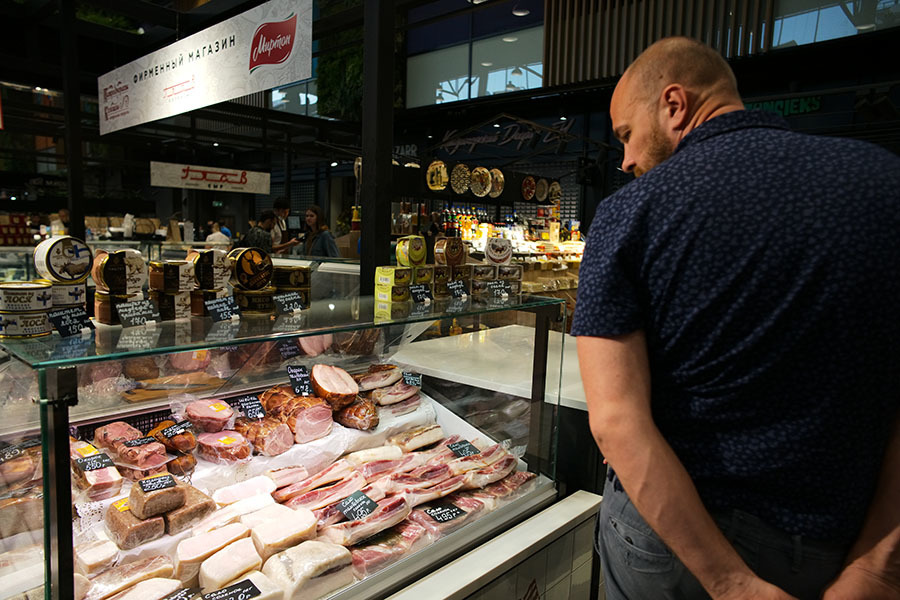The Russian government continues to closely monitor food prices on a daily basis, including unreasonable increases.
This was announced on Friday, July 16, by the presidential press secretary Dmitry Peskov.
“Measures are constantly being taken.
This does not mean that we can insure ourselves against any abrupt situations in certain regions, in certain stores.
But in the country as a whole, certain mechanisms of containment have been formulated and are in effect, ”the Kremlin spokesman emphasized.
Note that in June, the annual growth rate of consumer prices in Russia accelerated to 6.5%, and the level of food inflation rose to 7.9%.
The last time similar indicators could be observed back in 2016.
This is evidenced by the materials of Rosstat.
According to the ministry, over the past year, beets and carrots have risen the most in food prices in the country - more than twice.
In addition, the cost of potatoes (by 48%), sugar (44%), sunflower oil (27%), chicken eggs (21), poultry (15), as well as pasta and bakery products (by 8%) increased significantly.
It is noteworthy that fruits have risen in price less than others.
For example, bananas and pears rose in price by only 5% and 2.7%, respectively.
In turn, oranges, on the contrary, fell in price by 2.5%, lemons - by almost 10%, and apples - by more than 16%.
“The main contribution to the acceleration of food inflation in June was made by fruits and vegetables.
The reason for the observed dynamics was one-off factors on the supply side, including the depletion of stocks of domestic products, an increase in the share of imports and late sowing, "Alexander Rozman, senior analyst at Forex Optimum, explained in an interview with RT.
In addition, one of the main factors behind the rise in prices for the bulk of food products in Russia was the general rise in food prices on the international market.
This point of view in an interview with RT was expressed by Georgy Ostapkovich, director of the Center for Market Research at the Institute for Statistical Studies and Economics of Knowledge, NRU HSE.
“This year the value of goods and assets is growing all over the world.
This is due to the fact that in order to combat the consequences of the pandemic, countries threw a large amount of unsecured money into the global financial system - that is, they launched a printing press.
Money became cheaper and, naturally, entrepreneurs raised the cost of their goods.
As a result, all assets have risen in price - from steel to food, ”said Ostapkovich.
According to UN estimates, world food prices began to rise rapidly in 2020, and in May 2021 they reached their highest level in the last 10 years.
However, by the end of June, agricultural products on the international market fell slightly.
According to Georgy Ostapkovich, if this trend continues in the coming months, food inflation in Russia may slow down.
RIA News
© Sergey Pyatakov
As Russian Prime Minister Mikhail Mishustin noted earlier, in the face of rising world prices for goods, it has become more profitable for many Russian enterprises to supply their products abroad.
The active export of food, in turn, led to a shortage of some goods in Russia, as a result of which prices within the country increased further.
“It is important to say about one more reason why prices are rising.
This is the greed of individual manufacturers and retail chains.
And here I want to remind you: the government has enough tools to curb the appetites of those who profit from the rush demand in all spheres, ”Mishustin said.
The topic of increasing food prices was also raised during the annual direct line with Vladimir Putin on June 30.
The Russian leader recalled that the government has already taken a number of measures to resolve the problem.
In particular, agreements were concluded on freezing prices for some products, subsidies were issued to a number of manufacturers, and export duties were increased.
“The question is about other regulatory measures, so in general, of course, the state pays attention to this.
Maybe sometimes out of time.
I just spoke about this at one of my meetings with the government.
I repeat once again: measures are being taken, ”the head of state emphasized.
According to Alexander Rozman, from July to August, seasonal factors may also exert pressure on food prices in Russia.
So, against the background of the new harvest in the country, the supply of fruits and vegetables should increase.
As a result, the deceleration of food inflation in Russia may begin as early as late summer - early autumn, says Georgy Ostapkovich. According to him, by the end of 2021, the average growth rate of food prices will decrease from the current 7-8% to 6.8-7%.

